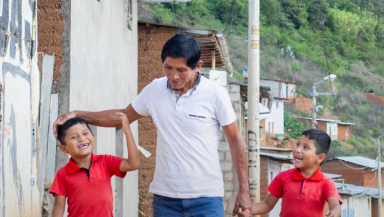Young Britons more hopeful than older generations about ending global poverty, survey finds

⭐️⭐️⭐️⭐️⭐️
Young people are more likely to believe that global poverty can be eradicated, but this optimism declines sharply with age, a new study by Compassion UK has found.
According to the study, which was carried out by Savanta on behalf of the charity, over half (54%) of 18 to 34 year olds believe that eradicating poverty worldwide is possible.
That confidence drops to 45% among 35 to 54 year olds and just over a quarter (27%) among those aged 55 and above.
The overall number of UK adults who think ending extreme poverty is achievable has fallen from 48% in 2024 to 41% this year, continuing a steady downward trend from 49% in 2023.
Despite this decline, the survey revealed a strong appetite for action.
Nearly half of respondents identified generating public awareness (54%), pushing for government intervention (51%), and adopting more sustainable habits (49%) as the most effective ways to eradicate poverty.
When asked about obstacles, most people cited global conflict (44%), followed by limited access to clean water (40%), and poor governance or corruption (30%).
The findings were published on the UN’s International Day for the Eradication of Poverty on Friday.
Compassion UK chief executive Justin Dowds said the results highlight a generational shift in perspective, with younger people inspired by hope and faith in change.
He said: “We believe, and the next generation believes, that a world without poverty is possible.
“I have seen extreme poverty dramatically reduce in my lifetime, but sadly that rate of decline is slowing. We are seeing poverty increasingly concentrated in Sub-Saharan Africa and in fragile, conflict-affected regions, where climate-related impacts disproportionately affect the poor.”
Data from the World Bank shows that the number of people living in extreme poverty has fallen sharply over the last 40 years — from around two billion in the 1980s to approximately 831 million today, or about 9% of the global population.
If the same pace of progress continues, Gen Z might be the generation that finally turns the dream of ending extreme poverty into reality.
A separate survey conducted by Compassion involving 387 young people involved in Ugandan projects found that 91% believe poverty can be eradicated globally.
That optimism is embodied by Noirine Khaitsa, who grew up in extreme poverty but was sponsored through a Compassion project at her local church. Today, she works as a senior manager for Compassion Uganda.
“Every day, I see how real change begins with one person,” Khaitsa said.
“When the life of an individual changes, as mine did, it can release an entire family, community, and nation from the grips of poverty.”


She shared the story of Sifuloza, a young Ugandan woman once uncertain about her future who is now studying medicine thanks to Compassion’s Leadership Development Initiative.
Her success has inspired her sisters to start small businesses and complete their education, lifting their entire family out of hardship.
“Young people around the world are driven by a powerful sense of justice and they’re ready to act, often sacrificially, with an unshakable sense of purpose” Khaitsa said.


“Their optimism is contagious, and will be transformational for countless people living in poverty around the world.”
Compassion, a Christian child development charity, has worked with children and communities in Uganda since 1980.
Presenter of The Way UK, Izzy Madavan, Europe’s biggest digital youth ministry, recently visited Compassion projects in Uganda and saw firsthand how faith and local partnerships are reshaping communities.


She recalled: “I was struck by the godly and competent people who bring life and light into the communities in Uganda. Young people are working with the local church to break the cycle of poverty for the families and communities.
“While there, I met families, including the brothers my mum and I sponsor, and saw how each child was truly known and cared for in their individual needs. I also met programme graduates whose lives, and the lives of their future generations, have been transformed by being lifted out of poverty.
“I believe it’s down to people of my generation to tackle extreme poverty so that there will be a future free from its devastating effects. I’ve witnessed this in a small way in Uganda, and I’m confident it can be done elsewhere.”


Compassion UK’s church-led initiatives currently support over two million children in 29 countries, providing education, healthcare, and personal development programmes that empower young people to thrive.
https://www.christiantoday.com/news/young-britons-more-hopeful-than-older-generations-about-ending-global-poverty-survey-finds
⭐️Singer/Songwriter/Voice Talent/Actor/Media Personality⭐️
Born in Syracuse, NY. He holds a bachelor of science degree in communication from Florida Institute of Technology with specialization in technical writing, business, public relations, marketing, media, promotion, and aerospace engineering.
⭐️ Las Vegas Entertainer ⭐️ MTV uplaya Platinum Auddy Award Winner ⭐️ Southeastern FTTF Talent Champion ⭐️ Movies & TV ⭐️ Listed in ‘Who’s Who’ publication ⭐️ Voted ‘MOST MARKETABLE’: Sonic Records ⭐️ U.S. Veteran ⭐️

















